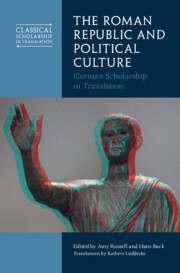Book contents
- The Roman Republic and Political Culture
- Classical Scholarship in Translation
- The Roman Republic and Political Culture
- Copyright page
- Contents
- Figures
- Tables
- Contributors
- Acknowledgements
- Part I Original Essays
- Part II Translations
- Chapter 4 Benevolence and Freedom
- Chapter 5 Capitol, Comitium, and Forum
- Chapter 6 Face to Face with the Ancestors
- Chapter 7 Rituals of Integration in the Roman Republic
- Chapter 8 The Message of the Medium
- Chapter 9 The memoria of the gentes as the Backbone of Collective Memory in Republican Rome
- Chapter 10 The Ritual Grammar of Institutionalized Politics
- Chapter 11 Aristocratic Roles and the Crisis of the Roman Republic
- Chapter 12 Monuments and Consensus
- Chapter 13 Publicity or Participation?
- References
Chapter 9 - The memoria of the gentes as the Backbone of Collective Memory in Republican Rome
from Part II - Translations
Published online by Cambridge University Press: 30 January 2025
- The Roman Republic and Political Culture
- Classical Scholarship in Translation
- The Roman Republic and Political Culture
- Copyright page
- Contents
- Figures
- Tables
- Contributors
- Acknowledgements
- Part I Original Essays
- Part II Translations
- Chapter 4 Benevolence and Freedom
- Chapter 5 Capitol, Comitium, and Forum
- Chapter 6 Face to Face with the Ancestors
- Chapter 7 Rituals of Integration in the Roman Republic
- Chapter 8 The Message of the Medium
- Chapter 9 The memoria of the gentes as the Backbone of Collective Memory in Republican Rome
- Chapter 10 The Ritual Grammar of Institutionalized Politics
- Chapter 11 Aristocratic Roles and the Crisis of the Roman Republic
- Chapter 12 Monuments and Consensus
- Chapter 13 Publicity or Participation?
- References
Summary
Modes and purposes of the memorial practices of aristocratic families were formative to Roman readings of the past. The memoria of the gentes was imprinted deeply on the Republic’s history culture, but was subject to the challenges from other formats of remembering the past, historiography in particular. The pompa and laudatio funebris both heralded and magnified a family’s esteem through the display of imagines and the recollection of narratives of exemplary virtue. While these achievements were uncontested among the gens itself, in the public arena they might have been a bone of contention. The memoria of the gentes distorted that of the Republic as a whole, influencing the work of the first historians, the compilation of lists of magistrates and office-holders, and the outlook of public space. Historiography also distanced and indeed distinguished itself from the memoria of the elites. Discourses of decadence widened the gap between the two media. Meanwhile citizens outside Rome were more removed from the mechanisms of aristocratic remembering and could only access a history of Rome in written format. Elite memories ceased to wield their magnetic force, but they also lingered on in historiography.
Keywords
- Type
- Chapter
- Information
- The Roman Republic and Political CultureGerman Scholarship in Translation, pp. 272 - 293Publisher: Cambridge University PressPrint publication year: 2025

